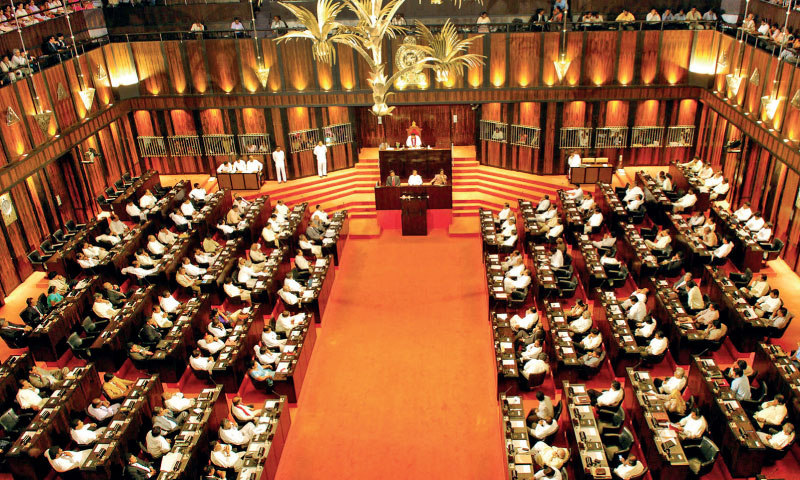Tuesday Feb 17, 2026
Tuesday Feb 17, 2026
Monday, 18 November 2024 00:20 - - {{hitsCtrl.values.hits}}

It is unlikely that democracy will yield greater returns solely because of the moral fortitude of the agents entrusted with governing on our behalf
 It is broadly accepted that the Sri Lankan coconut industry, especially the smallholder segment, is highly unproductive. It has been reported that the average yield per hectare in Sri Lanka is less than half the yield in Andhra Pradesh where the climatic conditions are not dissimilar. This problem is not new.
It is broadly accepted that the Sri Lankan coconut industry, especially the smallholder segment, is highly unproductive. It has been reported that the average yield per hectare in Sri Lanka is less than half the yield in Andhra Pradesh where the climatic conditions are not dissimilar. This problem is not new.
Thirty years ago, I was asked to evaluate several information projects including the coconut information system managed by the Coconut Research Institute. The information system was exemplary, but I concluded that it all seemed pointless because the end objectives of producing more coconuts and improving the livelihoods of the growers were not being achieved. During the entire period of study, yields were declining. I was not asked to conduct evaluations after that.
Information, however good, cannot improve productivity unless the owners are motivated to invest. Digital interventions will not have the desired effects unless the analogue complements are present. Possibly because of the after-effects of land reforms of the 1970s, the absentee owners of many of the 50-acre coconut lands appear to be stuck in a low-level equilibrium. Low yields/returns discourage investment; low investment results in low yields/returns.
Many of us appear to believe that what ails our democratic system of governance can be fixed by changing the people who we elect to represent us. It’s good that we change our representative periodically, but that itself may not do the job. Providing more, better information did not prevent the coconut yields going down. Unless systems are changed, good outcomes will not result. Insights drawn from the application of principal-agent theory to the coconut industry can be helpful in diagnosing the ills of our democratic system and in identifying remedies.
Principal-agent theory
Framing the problem of low yields in the coconut industry in terms of principal-agent theory can help. The principal is the owner of the land who lives and works in Colombo or elsewhere. For the current purposes, I will exclude the large company-owned estates.
A proper on-site manager may be difficult to justify because the land is 50 acres or less, so the absentee owner employs a watcher or two, usually underpaid, to serve as his agent(s) and visits occasionally. His interest is in gaining the optimum return from the inherited land. The watchers’ interests are in the quiet life with possibly some supplemental income through unauthorised coconut sales.
It is assumed that the principal will wish to ensure the appointed agents do his will. The theory posits that this will be difficult because the agent’s preferences are different from those of the principal and because the agent always has more information about the ground situation than the principal. If the principal wishes to achieve the outcomes he desires, he must select the agents with due care and thereafter supervise their actions diligently, for example by using remote monitoring technology, through random, unannounced visits, and by providing proper incentives to the agents such as compensation pegged to the reported yield of coconuts or sales.
All this requires higher investments. For example, performance-based compensation will necessarily bring up the question of high-yielding plants and scientifically applied fertiliser. Is the owner willing to bear the costs? As yield goes up, the question of preventing theft must be addressed. Fences, cameras, alarms all cost money.
Is it fair for the total burden to be borne by the owner when a portion of the generated returns will go to the watcher? Is a risk and investment sharing model more sustainable? High-yielding plants and scientific agricultural practices may require the services of a person more skilled, and more expensive, than the current watcher.
The above interdependent factors explain the persistence of the low-level equilibrium in the Sri Lankan coconut industry. This may also be described in terms of principal-agent effect-based x-efficiency. X-efficiency was a concept introduced by Harvey Liebenstein to explain why firms did not operate as efficiently as they should. One of the principal causes is lack of competitive pressure. But the principal-agent effects can also cause x-efficiency.
The ills of the coconut industry can be addressed separately. Our purpose here is to see what kind of insights may be generated to help understand the maladies of Sri Lankan democracy.
Fixing democracy
Through mostly peaceful protests over multiple months, enraged citizens compelled an incompetent president to resign. A ruling family that appeared invincible was reduced to 2.57% of the votes cast at the first election held after the Aragalaya. The narrative that all politicians are thieves responsible for causing the crisis that emerged from the Aragalaya was successfully co-opted by the National People’s Power to win the Presidential election. More than 60 incumbent MPs have already retired from politics, and more are likely to be defeated in the upcoming general election.
Yet, the citizens stopped short when asked to attack Parliament at a decisive moment. Unlike in Bangladesh, power changed according to the Constitution. After the economy was more or less stabilised, elections were held. The voters have elevated a party that was on the margins to power, albeit with 42% of the vote. It is likely that the NPP will gain a higher percentage of the lower number of ballots that will be cast at the general election.
The rage, the grumbling is still there, two years after a president was chased out and one month after an outsider was elected. This is not productive for a country that has to deal with the economic crisis that is still not over and the challenges of getting on a growth path.
To revert to the coconut-land analogy, we have thrown out the head watcher we suspected was cheating us of coconuts and got ourselves a new one who is promising to be honest and even impose pay cuts on the others working on the land to demonstrate his commitment.
But we need to make greater investments in the form of high-yield plants and scientifically applied fertiliser. Are we paying enough attention to the qualifications and skills of the people we’re hiring to manage our investments? Are we installing the right security systems to ensure that we will not be robbed again, by outsiders and/or by the watchers themselves? Are we setting in place the right incentives, so the interests of our agents are aligned with our interests? Will the proposed pay cuts be penny wise and pound foolish, causing the underpaid employees to steal coconuts and sell the fertiliser on the side?
It is unlikely that democracy will yield greater returns solely because of the moral fortitude of the agents entrusted with governing on our behalf. To spring ourselves up from the low-level equilibrium we are stuck in, we need something more than good intentions and moral values.
We need system change, as the Aragalaya protesters intuited. System change started with new legislation such as the Anti-corruption Act and the Regulation of Election Expenses Act, both enacted in 2023. The results are beginning to be seen, with the asset declarations of candidates being available for all to see (an outcome of the Anti-corruption Act) and the shift to lower-cost campaigning methods in the General Election (an outcome of the election expenses law). Can we work to build on these successes, instead of continuing the blame game?